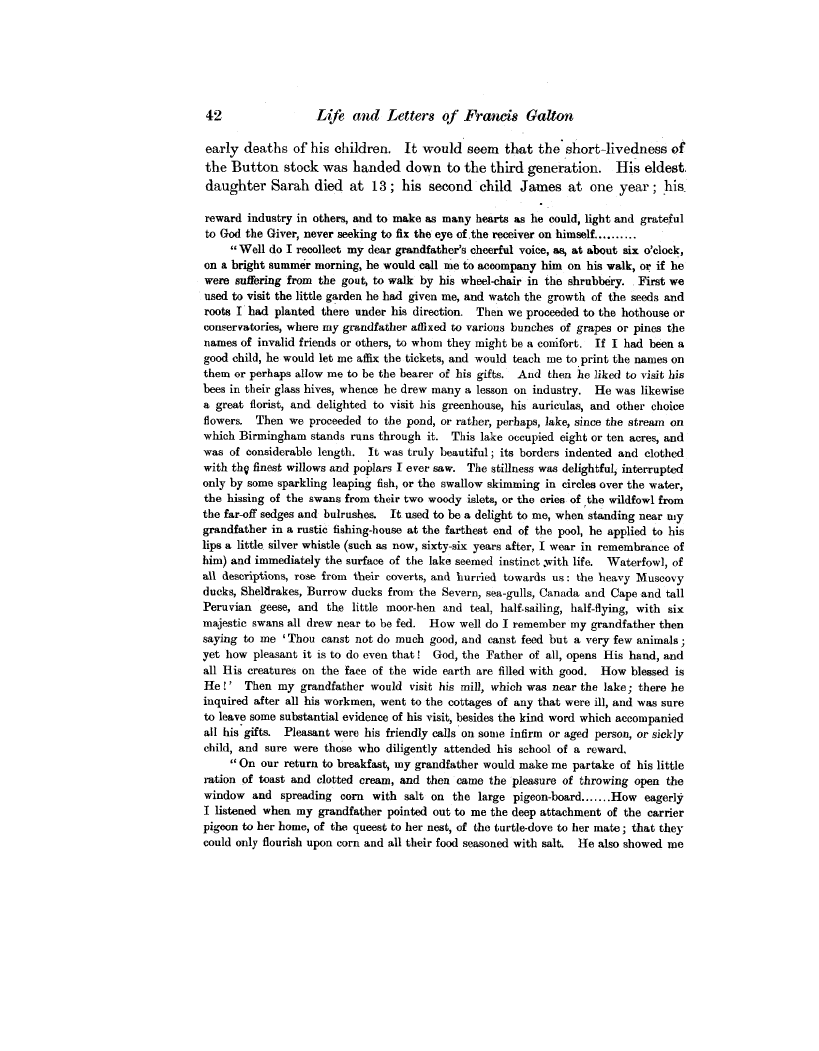| ||||||

OCR Rendition - approximate
42 Life and Letters of Francis Galton early deaths of his children. It would seem that the short-livedness of the Button stock was handed down to the third generation. His eldest, daughter Sarah died at 13; his second child James at one year ; his_ reward industry in others, and to make as many hearts as he could, light and grateful to God the Giver, never seeking to fix the eye of. the receiver on himself "Well do I recollect my dear grandfather's cheerful voice, as, at about six o'clock, on a bright summer morning, he would call me to accompany him on his walk, or if he were suffering from the gout, to walk by his wheel-chair in the shrubbery. . First we used to visit the little garden he had given me, and watch the growth of the seeds and roots I had planted there under his direction. Then we proceeded to the hothouse or conservatories, where my grandfather affixed to various bunches of grapes or pines the names of invalid friends or others, to whom they might be a comfort. If I had been a good child, he would let me affix the tickets, and would teach me to print the names on them or perhaps allow me to be the bearer of his gifts. And then he liked to visit his bees in their glass hives, whence be drew many a lesson on industry. He was likewise a great florist, and delighted to visit his greenhouse, his auricular, and other choice flowers. Then we proceeded to the pond, or rather, perhaps, lake, since the stream on which Birmingham stands runs through it. This lake occupied eight or ten acres, and was of considerable length. It was truly beautiful ; its borders indented and clothed with thg finest willows and poplars I ever saw. The stillness was delightful, interrupted only by some sparkling leaping fish, or the swallow skimming in circles over the water, the hissing of the swans from their two woody islets, or the cries of the wildfowl from the far-off sedges and bulrushes. It used to be a delight to me, when standing near my grandfather in a rustic fishing-house at the farthest end of the pool, he applied to his lips a little silver whistle (such as now, sixty-six years after, I wear in remembrance of him) and immediately the surface of the lake seemed instinct with life. Waterfowl, of all descriptions, rose from their coverts, and hurried towards us: the heavy Muscovy ducks, Sheldrakes, Burrow ducks from the Severn, sea-gulls, Canada and Cape and tall Peruvian geese, and the little moor-hen and teal, half-sailing, half-flying, with six majestic swans all drew near to be fed. How well do I remember my grandfather then saying to me ` Thou canst not do much good, and canst feed but a very few animals ; yet how pleasant it is to do even that ! God, the Father of all, opens His hand, and all His creatures on the face of the wide earth are filled with good. How blessed is He!' Then my grandfather would visit his mill, which was near the lake; there he inquired after all his workmen, went to the cottages of any that were ill, and was sure to leave some substantial evidence of his visit, besides the kind word which accompanied all his gifts. Pleasant were his friendly calls on souse infirm or aged person, or sickly child, and sure were those who diligently attended his school of a reward, " On our return to breakfast, my grandfather would make me partake of his little ration of toast and clotted cream, and then came the pleasure of throwing open the window and spreading corn with salt on the large pigeon-board How eagerly I listened when my grandfather pointed out to me the deep attachment of the carrier pigeon to her home, of the queest to her nest, of the turtle-dove to her mate ; that they could only flourish upon corn and all their food seasoned with salt. He also showed me
|